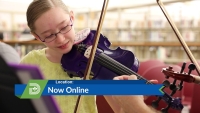Music Equity: Providing Access to Music Education
Dallas Public Library
Innovation Synopsis
Before the pandemic, the library offered music classes at the central library, and during, the library created a robust music program online. Now, the library is expanding access to music education in low-income neighborhoods by offering classes at libraries in these areas. Libraries will offer string classes, group play and performances.
Challenge/Opportunity
The benefits of music education are significant to well being, and children who attend music classes have better language and math skills, as well as higher self esteem. Yet, the cost of instruction and instruments means these classes are out of reach to many low income families. Expanding the music classes into neighborhoods with low-incomes will give access to many who would not have it otherwise. Access to music lessons and instruments will help improve self confidence and musical ability in students.
Key Elements of Innovation
The library has had great success in offering music classes at the Central Library and virtually, quickly moving to an online format when it became necessary. The library will recreate these classes at libraries located in low income neighborhoods. Instructors will be hired and instruments will be purchased for classes. Classes offered will include Music Theory, Ukulele, Guitar, Keyboard, Violin, Viola and Stringed Orchestra. Online classes and classes at the Central Library will continue during this time.
Achieved Outcomes
The library’s music program has been very successful, both in-person and virtually, with high attendance and great feedback from customers. All virtual classes fill up within the first week they are opened for registration. It is hoped that the program will have continued success at branch locations as well. Outcomes will be measured by attendees’ perceived improvement in self confidence, perceived improvement in musical skill, perceived improvement in ability to play their instrument and attendance numbers for classes.

